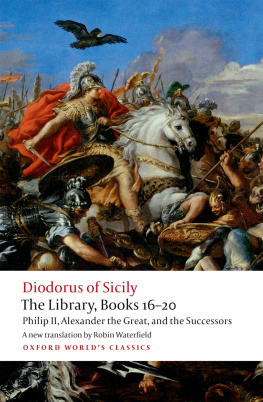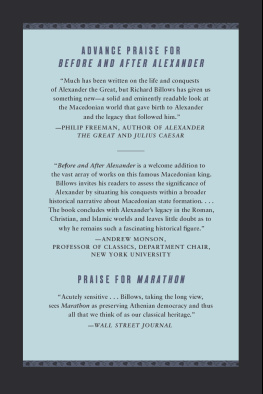The Legendary Adventures of Alexander the Great
TRANSLATED BY RICHARD STONEMAN
PENGUIN EPICS
PENGUIN BOOKS
Published by the Penguin Group
Penguin Books Ltd, 80 Strand, London WC2R 0RL , England
Penguin Group (USA) Inc., 375 Hudson Street, New York, New York 10014, USA
Penguin Group (Canada), 90 Eglinton Avenue East, Suite 700, Toronto, Ontario, Canada M4P 2Y3
(a division of Pearson Penguin Canada Inc.)
Penguin Ireland, 25 St Stephens Green, Dublin 2, Ireland (a division of Penguin Books Ltd)
Penguin Group (Australia), 250 Camberwell Road, Camberwell, Victoria 3124, Australia
(a division of Pearson Australia Group Pty Ltd)
Penguin Books India Pvt Ltd, 11 Community Centre, Panchsheel Park, New Delhi 110 017, India
Penguin Group (NZ), cnr Airborne and Rosedale Roads, Albany,
Auckland 1310, New Zealand (a division of Pearson New Zealand Ltd)
Penguin Books (South Africa) (Pty) Ltd, 24 Sturdee Avenue,
Rosebank, Johannesburg 2196, South Africa
Penguin Books Ltd, Registered Offices: 80 Strand, London WC2R 0RL , England
www.penguin.com
The Greek Alexander Romance first published in Penguin Classics 1991
This extract published in Penguin Books 2006
1
Translation copyright Richard Stoneman, 1991
All rights reserved
The moral right of the translator has been asserted
Taken from the Penguin Classics edition of The Greek Alexander Romance,
translated and edited by Richard Stoneman
Except in the United States of America, this book is sold subject to the condition that it shall not, by way of trade or otherwise, be lent, re-sold, hired out, or otherwise circulated without the publishers prior consent in any form of binding or cover other than that in which it is published and without a similar condition including this condition being imposed on the subsequent purchaser
ISBN-13: 978-0-141-02638-1
Note
The Greek Alexander Romance is an extraordinary cornucopia of stories and legends about Alexander the Great brought together from many different sources. Its influence in its many translations is incalculable, as it was the origin of the Alexander tales in countries across Eurasia.
These selections from the Romance (which was given its roughly final form at some point between Alexanders death in 323 BC and the third century AD ) show the works immense appeal, as its anonymous writers zanily bounce from fact to supposition to surreal fantasy.
In our opinion, Alexander the king of the Macedonians was the best and most noble of men, for he did everything in his own way, finding that his foresight always worked in harness with his virtues [] We are going now to speak of the deeds of Alexander, of the virtues of his body and his spirit, of his good fortune in action and his bravery; and we will begin with his family and his paternity. Many say that he was the son of King Philip, but they are deceivers. This is untrue: he was not Philips son, but the wisest of the Egyptians say that he was the son of Nectanebo, after the latter had fallen from his royal state.
This Nectanebo was skilled in the art of magic, and by its use overcame all peoples and thus lived in peace. If ever a hostile power came against him, he did not prepare armies, nor build engines of war nor construct transport wagons, he did not trouble his officers with military exercises, but took a bowl and carried out a divination by water. He filled the bowl with spring water and with his hands moulded ships and men of wax, and placed them in the bowl. Then he robed himself in the priestly robes of a prophet and took an ebony staff in his hand. Standing erect, he called on the so-called gods of spells and the airy spirits and the demons below the earth, and by the spell the wax figures came to life. Then he sank the ships in the bowl, and straightaway, as they sank, so the ships of the enemy which were coming against him perished. All this came about because of the mans great experience in the magic art. And thus his kingdom continued in peace.
After some time had gone by there came men on reconnaissance, whom the Romans call exploratores and the Greeks kataskopoi, and they informed Nectanebo of a black cloud of war, a force of innumerable armed men advancing on Egypt. Nectanebos general came to him and said: O King, live for ever! Put aside now all the ways of peace and prepare yourself for the manoeuvres of war. For a great storm cloud of barbarians is threatening us: it is not one people that advances against us, but a horde of 10,000. Those who are coming against us are the Indians, the Nocimaeans, the Oxydorcae, the Iberians, the Kauchones, the Lelapes, the Bosporoi, the Bastranoi, the Azanians, the Chalybes and all the other great peoples of the East, and their massed army of countless armed men is advancing on Egypt. Set all else aside and consider your position.
This is what the general said to Nectanebo. But the king laughed and said to him: You have spoken well and fittingly for one to whom our protection has been entrusted, but you speak like a coward and not like a soldier. Strength does not lie in numbers, but the issue of war depends on zeal. One lion may overcome many deer, and one wolf may shear many flocks of sheep. Go with the soldiers who are under your command and get ready for battle. But I, with a single word, shall overwhelm this huge horde of barbarians in the sea. And so saying, Nectanebo sent his general away.
Nectanebo stood up and went into his palace, and when he was alone he made all his usual preparations and gazed into the bowl. There he saw the gods of Egypt steering the ships of the barbarians, and the armies under the command of the same gods. Nectanebo, being a man experienced in magic and accustomed to talk with his gods, realized that the end of the Egyptian kingdom was at hand. He filled his garments with gold, and shaved his hair and beard. Thus transformed in appearance, he fled to Pelusium. From there he sailed away to Pella in Macedonia, and settled there as an Egyptian prophet, and foretold to many people events that were hidden in the stars.
Meanwhile, the Egyptians asked their so-called gods what had become of the King of Egypt, since all of Egypt had been overrun by the barbarians. And the self-styled god in the sanctuary of the Serapeum spoke an oracle to them: This king who has fled will return to Egypt not as an old man but as a youth, and he will overcome our enemies the Persians. They asked one another what the meaning of this saying might be; but, finding no answer, they wrote down the oracle that had been given to them on the pedestal of the statue of Nectanebo.
Nectanebo soon became a familiar figure to everyone in Macedonia. King Philip happened to be childless by his wife, Olympias, and as he was going to be away at war for a long time, he called her to him and said, Take note of this: if you do not bear me a son after I return from the war, you shall never know my embrace again.
When the day ended, Philip went off to war with his entire army. One of Olympias servants, realizing why her mistress was so sad, said to her, Lady, I have something to tell you; I will say it, if you will not hold it against me.
Speak, replied the queen, I shall not hold it against you. If it is what I want to hear, I shall certainly owe you my thanks. Then the maid went on, There is in the city a man from Egypt who is able to fulfil everything that the soul desires, if you will only allow him to see you. Olympias did not hesitate but sent for him right away and ordered him to come in to her.
When Nectanebo saw her, he began to lust after her beauty. He held out his hand and said, Greetings, queen of the Macedonians.
Greetings to you too, most excellent of prophets, she replied. Come in and sit down.












